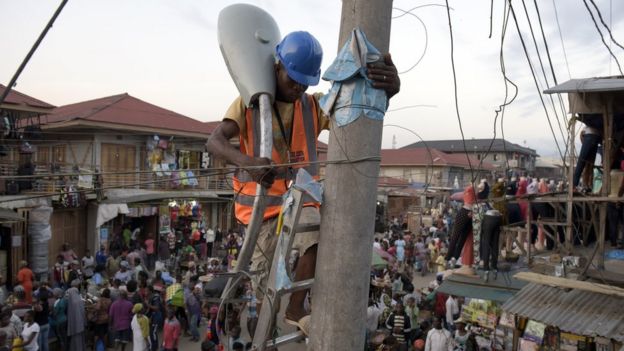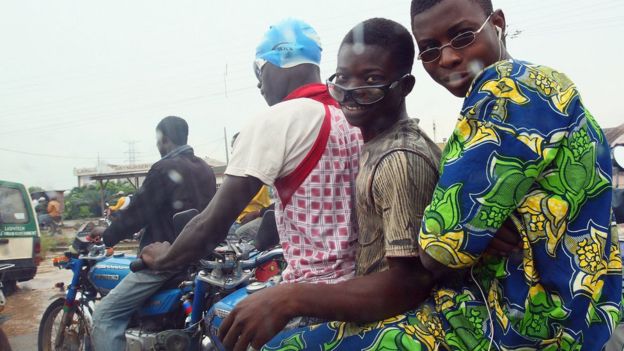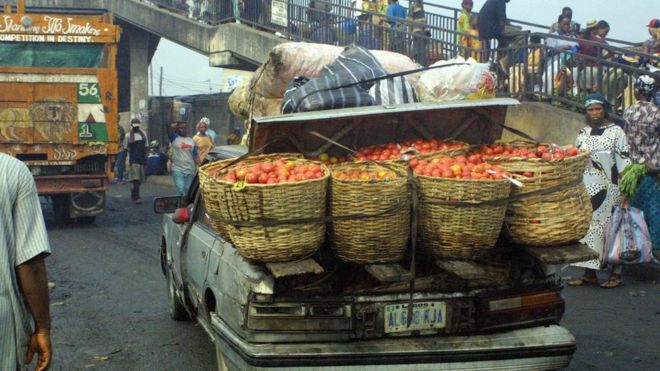When President Muhammadu Buhari took over power in May 2015, many Nigerians expected him to wave a wand and bring about change.
They felt that their votes had hired the right man who would immediately fix all that was wrong with our country.But, while delivering a speech to commemorate Nigeria's 55 years of independence from the UK on 1 October, President Buhari made it clear that he would not do the job on his own.
He invited every Nigerian to share the burden of change with him: "We all have a part to play to bring about change.
"We must change our lawless habits... We must change our unruly behaviour... To bring about change, we must change ourselves."
Few of us who live in Nigeria can deny knowledge of exactly what our president was talking about.
We are quite familiar with ubiquitous unruly behaviour:
- The Nigerians who will never stand in any queue, who must make their way to the front as soon as they arrive
- The drivers who will never stop at a traffic light, who consider it anathema to allow an empty space in front of their vehicles
- The invisible individuals who excrete piles of solid waste on the pavements, night after night
- The staff who take three weeks' leave to attend their father's burial, then another three weeks later in the year to attend their father's burial, again. "That first one was my father who paid my school fees," they say. "This one is my biological father"
- The mothers who threaten the head teacher with fire and brimstone because their children were punished for coming late to school
- The bosses who, in the presence of their entire staff, praise you for your excellent work skills, then wink and ask if you also have excellent "bedroom skills", while everyone present bursts out laughing
- The top government officials who show off their importance by the number of people jam-packed into their waiting rooms. They give you an appointment for 7am, knowing full well that they do not intend to see you until 10pm
- The air hostesses who frown throughout the flight, to avoid giving you the false impression that they are at your beck and call
- The "big men" and "big women" who scream "Do you know who I am?" when you ask for some identity before they can be allowed through the gate
- Those who ring the airline to request that the flight be delayed for their sakes, while their fellow passengers gaze out of the aeroplane windows for an hour, wondering why the flight is delayed, this time
 |
| It is common for people in Nigeria to make illegal electricity connections |
 |
| The laws of the road are not often obeyed in Africa's most populous country |
And, like President Buhari has pointed out, for the country to move forward, these bad habits have to change.
But change will require more than passionate appeals from revered leaders.
For many Nigerians, unruly behaviour has become ingrained. It is now a case of "I know it, but I just can't help it".
Back in 1983, when he took over power in a military coup, President Buhari enforced his "War Against Indiscipline" (WAI) with the help of armed personnel, who punished unruly behaviour with instant penalties, such as frog jumps in the street.
WAI worked. Nigerians began to behave themselves.
But times have changed. Today's Nigeria is a democracy. Doling out instant corporal punishment in public with soldiers both administering and executing justice goes against the country's constitution.
A good place to start would be to understand the origin of this unruly behaviour.
Would you do this in London?
The same Nigerians who find it impossible to queue up at the Murtala Muhammed Airport in Lagos immediately stand in line when they arrive at Heathrow.And you are unlikely to hear a Nigerian "big man" barking "Do you know who I am?" to a cleaner on the streets of London.
He knows that he could easily end up spending the night in jail.
My father once told me how anyone who defecated in public was punished back when he was growing up.
The pile of excreta would be set alight, and a generous quantity of red pepper added to the flames.
Doing this was believed to cause the culprit's anus to begin to burn and itch wherever he was. And this belief acted as deterrent against people defecating in public places.
In today's Nigeria, where weak modern institutions have replaced traditional checks and balances, hardly any deterrents against lawlessness exist.
People have become used to getting away with almost anything. Many Nigerians consider themselves a law unto themselves.
But, anything is possible. President Buhari wants Nigerians to change and change we can.
After all, the Europeans who berthed on Africa's shores in the colonial era were able to replace entire peoples' habits with completely new and different ways.
The past few decades have seen Nigeria inviting all manner of experts from far and wide to assist with recommendations and solutions for our country's diverse issues.
We have had the economic experts, the financial, security, political, agricultural, trade, health, but now may be the time for the Nigerian government to engage psychologists, experts at uncovering and disabling the inner forces that drive undesirable behaviour.
These behaviour modification experts could develop special programmes for leaders at different levels.
They could collaborate with government corporations and private organisations.
They could tinker with the curriculum in our country's schools, infusing regular lessons with programmes that would produce Nigerian citizens who would consider the effect of their every action on the world around them.

It will take a miracle. Can the leopard change spots?
ReplyDeleteWAI needs to make a comeback.the only language nigerians understand is force
DeleteI concur!
DeleteYes oh, Nigerians understand"force".
Delete